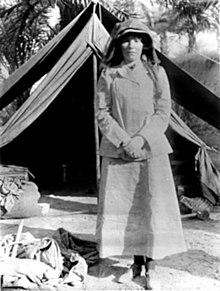Gertrude Bell
| Gertrude Bell | |
|---|---|

Gertrude Bell in 1909, visiting archaeological excavations in Babylon
|
|
| Born |
Gertrude Margaret Lowthian Bell 14 July 1868 Washington Hall, County Durham, England |
| Died | 12 July 1926 (aged 57) Baghdad, Mandatory Iraq |
| Nationality | British |
| Occupation | Traveller, political officer |
| Era | Victorian, Edwardian – 1900s |
| Known for | Writer, traveller, political officer, archaeologist, explorer, cartographer in Greater Syria, Mesopotamia, Asia Minor, and Arabia |
| Parent(s) |
Sir Hugh Bell
Mary Bell (née Shield)
|
Gertrude Margaret Lowthian Bell, CBE (14 July 1868 – 12 July 1926) was an English writer, traveller, political officer, administrator, spy and archaeologist who explored, mapped, and became highly influential to British imperial policy-making due to her knowledge and contacts, built up through extensive travels in Greater Syria, Mesopotamia, Asia Minor, and Arabia. Along with T. E. Lawrence, Bell helped support the Hashemite dynasties in what is today Jordan as well as in Iraq.
She played a major role in establishing and helping administer the modern state of Iraq, utilising her unique perspective from her travels and relations with tribal leaders throughout the Middle East. During her lifetime she was highly esteemed and trusted by British officials and given an immense amount of power for a woman at the time. She has been described as "one of the few representatives of His Majesty's Government remembered by the Arabs with anything resembling affection".
Bell was born on 14 July 1868 in Washington New Hall, County Durham, England – now known as Dame Margaret Hall – to a family whose wealth ensured her education and enabled her travels. Her personality was characterised by energy, intellect, and a thirst for adventure which shaped her path in life. Her grandfather was the ironmaster Sir Isaac Lowthian Bell, an industrialist and a Liberal Member of Parliament, in Benjamin Disraeli's second term. His role in British policy-making exposed Gertrude at a young age to international matters and most likely encouraged her curiosity for the world, and her later involvement in international politics.
Bell's mother, Mary Shield Bell, died in 1871 while giving birth to a son, Maurice (later the 3rd Baronet). Gertrude Bell was just three at the time, and the death led to a lifelong close relationship with her father, Sir Hugh Bell, 2nd Baronet, a progressive capitalist and mill owner who made sure his workers were well paid and cared for. Throughout her life, Gertrude consulted on political matters with her father, who had also served for many years in various governmental positions.
...
Wikipedia
